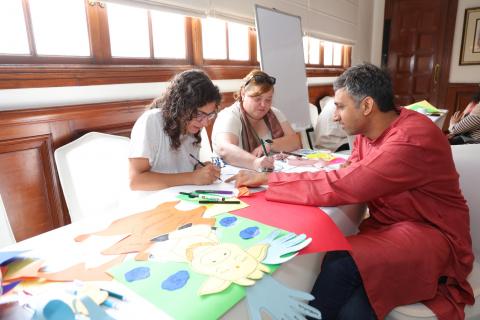
Do We Nurture the Child or the Curriculum?
Every child walks into school with a unique gift. But do we let that gift grow, or do we bury it under the weight of our curriculum? A simple question from Susan Mathison, a sixth-grade Social Studies teacher at Oyster River Middle School in Durham, NH, made me pause and reflect. She was one of the 18 visiting US educators who came to India as part of the Fulbright Teachers for Global Classrooms project.
The question wasn’t difficult to answer. We do impose a framework—our curriculum, syllabus, and assessment system. This trio is so rigid that, by the end of schooling, children are often left incapable of independent thinking. They are trained to execute well. We have produced some of the world’s finest executives and CEOs, but very few thought leaders. This gap is visible when we look at the number of patents registered by Indians or our share in Nobel Prizes.
A country with the highest share in the world’s population must aspire to have the highest share in all fields, including research and development. Alas, that’s far from true. And here I see the role of schooling. The lack of adequate resources for our children is a different issue altogether—almost 50 percent of children in our schools do not have access to resources needed for quality education.
But even schools with adequate resources have almost made learning a suffocating experience. The emphasis on achieving good grades easily leads to rote learning. This results in cognitive fatigue, and once the exams are over, students do not wish to engage in learning. The trend of celebrating post-exam days with binge-watching, partying, and traveling shows that learning tied to exams was an awful experience. Students did not enjoy the process of learning, nor did they taste the joy of knowledge.
Why is there so much rigidity in curriculum, syllabus, and assessment that they almost suffocate both teachers and learners? Can’t we imagine an alternative?
Why can’t a school have the freedom to design and develop its own curriculum, syllabus, and assessment system? It’s not that efforts have not been made, but such schools remain “alternative” and struggle to survive. The need is to make such schools mainstream. Our curricular frameworks need to be flexible enough to accommodate diverse ways of learning. For instance, if a child is involved in farming with her parents, how is she not learning? Technically, we call such students absent from school, but it is not an absence from learning. We can design assessments that evaluate what the child learned while assisting their parents in farming and map it to curricular goals. The same can be done for other lived experiences. Why can’t cooking at home count as homework or project work? With the help of parents, we can assess this and map it to curricular goals in various disciplines, including math and science.
Cut to the main theme from where we started. If we want to grow as a nation that thinks, we need to reimagine how we school our children. The suffocating trio of curriculum, syllabus, and assessment is making learning a tiring experience. And at best, we are producing executives, not thinkers. What will it take for us to break this suffocating mold and make learning truly alive?
- Log in to post comments
